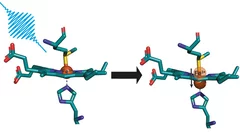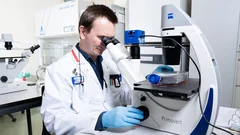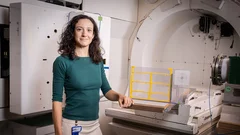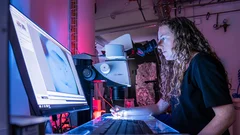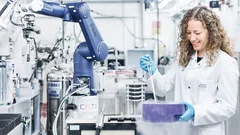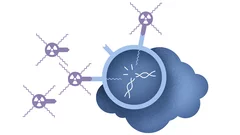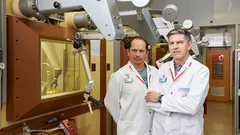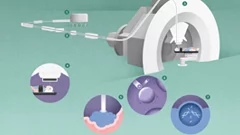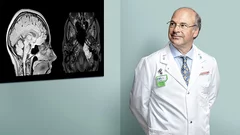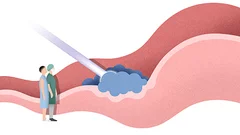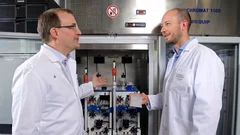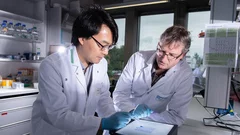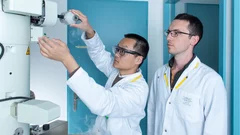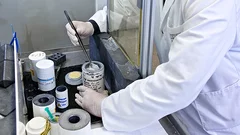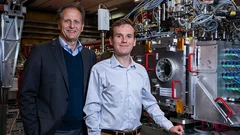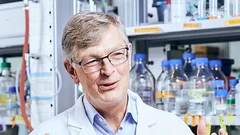Health Innovation
In the area of Health Innovation, several research groups at PSI are engaged in the study of fundamental questions regarding biology and cancer therapy. For example, they explore the structure of proteins – extremely complex biomolecules that are responsible for many different functions in organisms. Using PSI’s large research facilities, scientists also explore processes in biological tissue in order to fully understand their function and the development of specific diseases or deterioration processes. The ultimate goal is to find medicines that allow people to live as healthy a life as possible.
Patients with specific types of cancer are treated at the proton therapy facility on the PSI campus. Radiopharmaceuticals provide cancer treatments for very small tumours distributed throughout the body.
Find out more at: Overview Health Innovation
A protein's unexpected "doming"
Researchers have coaxed a secret out of the vital protein cytochrome c that it kept well-hidden up to now. Measurements at the X-ray free-electron laser SwissFEL reveal structural changes that science had previously ruled out for this kind of biomolecule.
More effective treatment of thyroid cancer
PSI researchers have found a more effective treatment for a form of thyroid cancer – and with fewer side effects – by increasing the uptake of the cancer drug in tumour cells. The results have been published in the medical journal Theranostics.
Mites in the spotlight
The world of microbes and viruses is extremely old and exceedingly diverse. With the large research facilities at PSI, researchers are peering deep inside this alien cosmos and investigating, above all, the proteins of these exotic beings.
New technique for ultrafast tumour therapy
For the first time, researchers at the Centre for Proton Therapy at PSI have tested ultrafast, high-dose irradiation with protons. The new, experimental FLASH technique could revolutionise radiation therapy for cancer.
A question of binding
At PSI, researchers are screening molecule fragments to see if these bind to important proteins of the coronavirus SARS-CoV-2 and thus have the potential to disable it. They are hoping the many individual pieces of information will yield an answer as to what an effective drug might look like.
Coronavirus advice: Ventilate, ventilate, ventilate!
SARS-CoV-2 might be transmitted via aerosols, that is, through the air. Researchers point this out in the journal Clinical Infectious Diseases. André Prévôt from PSI co-signed the publication. In this interview, he explains which precautionary measures he recommends.
Covid-19 research: Anti-viral strategy with double effect
Frankfurt scientists identify a possible weakness of the SARS-CoV-2 virus. They carried out part of their measurements at PSI's Swiss Light Source SLS. The research results are published this week in the scientific journal Nature.
Brilliant medicines
In the service of health, scientists at the Paul Scherrer Institute PSI work with radionuclides and develop agents to treat cancer and to detect tumours. Their research provides support to hospitals and is of great interest to Swiss industry.
Radionuclides for cancer therapy are in great demand
Radionuclides open up new options for treating cancer. Christian Rüegg, head of the Research with Neutrons and Muons Division at PSI, explains the significance of the Swiss Spallation Neutron Source SINQ at PSI.
Cancer medicine using PSI’s neutron source
At the neutron source SINQ, PSI researchers are producing special radionuclides that aid in the development of new and more effectively targeted cancer therapies. In this they collaborate closely with the clinics in the surrounding area.
Open fire on tumours
At the treatment stations of the Centre for Proton Therapy at PSI, tumours can be precisely irradiated from any direction. An interactive graphic explains how the protons get from the source to the body in order to trigger the elimination of tumour tissue.
"It's important to keep doing research"
Proton therapy is time-consuming and more costly than conventional radiation therapy, but its accuracy in targeting tumours is unsurpassed. An interview with Damien Weber, head of the Centre for Proton Therapy at PSI.
Cancer cells under attack
At PSI, cancer patients receive a therapy that is unique in Switzerland. Bombardment with protons wipes out cancer cells – and does so more precisely than with any other form of irradiation.
Preventing tumour metastasis
Researchers at the Paul Scherrer Institute PSI, together with colleagues from the pharmaceutical company F. Hoffmann-La Roche AG, have taken an important step towards the development of an active substance against the metastasis of certain cancers. Using the Swiss Light Source SLS, they deciphered the structure of a receptor that plays a crucial role in the migration of cancer cells.
Molecular scissors stabilise the cell's cytoskeleton
Researchers at the Paul Scherrer Institute PSI have an important part of the regulatory cycle that is involved in the formation and degradation of the cytoskeleton. Among other things, they have watched molecular scissors at work.
Bringing information into the cell
Researchers at the Paul Scherrer Institute PSI have elucidated an important part of a siganalling pathway that transmits information through the cell membrane into the interior of a cell. This exists in all mammals and plays an important role, among other things, in the regulation of the heartbeat. The new findings could lead to new therapies.
Children are her passion
At PSI, Beate Timmermann built up a programme providing proton therapy for children with cancer at the same time she was raising her own son. Today she is head of the Clinic for Particle Therapy at the West German Proton Therapy Centre in Essen (WPE) and is considered one of the most accomplished experts in this field.
Licence agreement with Swiss pharma firm for development of a cancer drug
A radioactive agent, developed at the Paul Scherrer Institute PSI to fight an especially malignant form of thyroid cancer, has the potential to become a blockbuster drug. Due to its structure, it might also be able to dock onto cells of other tumours and destroy them with its radiation. The Lausanne-based biopharmaceutical company Debiopharm wants to further develop the PSI agent to the point where it is approved as a drug. Debiopharm and PSI have now created the contractual basis for this.
This time, it's all bio: SwissFEL makes protein structures visible
For the development of new medicinal agents, accurate knowledge of proteins is crucial. In a pilot experiment, researchers have now, for the first time, used the X-ray free-electron laser SwissFEL of PSI for the examination of protein crystals.
A biotechnological revolution
Gebhard Schertler is head of the research division Biology and Chemistry at the Paul Scherrer Institute PSI and professor for Structural Biology at ETH Zurich. In this interview he talks about biological research at PSI and the future of drug development.
